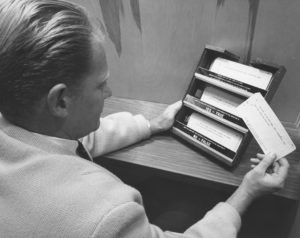-Written by Lincoln Cushing, Heritage writer
The clinking of glasses and din of conversation halted when the white-gloved archivists entered the room at the Smithsonian’s National Museum of American History.
Securely bedded on their cart was that evening’s crown jewel, a small, open-faced wooden box. Stuffed with the distinctive punch cards used in mainframe computers, this artifact represented the essence of Permanente Medicine – the sweat of laborers getting their first health examination, the fusion of physician practices with m

odern electronic systems, and the efficiencies of a medical plan that proudly served a nation in crisis during World War II.
This box and questionnaire cards were key elements of the Kaiser Permanente Automated Multiphasic Examinations.
Diane Wendt, Deputy Chair and Associate Curator of the Division of Medicine and Science, described the donation as “A humble but important object” in the history of American medicine when it was officially turned over at a Permanente Executive Leadership Summit event on Oct. 9, 2017.
The questionnaire cards represented an evolution of a battery of tests originally developed to handle the large influx of longshore workers that came into the health plan in the 1950s. In 1961, the U.S. Pu
blic Health Service awarded the Kaiser Foundation Research Institute a grant to study the automation of the multiphasic health testing it had already been conducting manually for 10 years. Members would now go through the screening stations with computer cards that got marked along the way. At the end of the session, which took a couple of hours, there would now be a computerized medical record of their current health status.
Those records helped create fundamental medical information. A major medical news story splashed across the world in 2016: “Historic Kaiser Permanente Data to Aid in Long-Term Study to Determine Extent of Ethnic Disparities in Brain Health and Dementia; new $13 million study funded by National Institute on Aging will revisit patients who were first screened as long as 50 years ago.” Yes, that deep data was compiled as part of the Automated Multiphasic examinations, showing the persistent value of that program.
To read the rest of this story, click here.





This Post Has 0 Comments